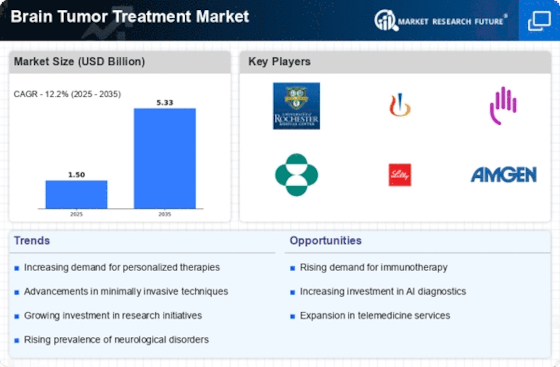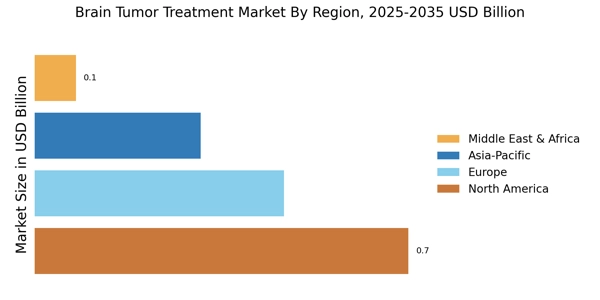Increasing Incidence of Brain Tumors
The rising incidence of brain tumors is a primary driver for the Brain Tumor Treatment Market. According to recent statistics, the prevalence of brain tumors has been steadily increasing, with an estimated annual incidence rate of approximately 6.5 per 100,000 individuals. This trend is likely attributed to various factors, including environmental influences and improved diagnostic techniques. As awareness grows and screening becomes more prevalent, more cases are identified, necessitating advanced treatment options. Consequently, healthcare providers are compelled to invest in innovative therapies and technologies to address this growing patient population. The demand for effective treatment solutions is expected to propel the Brain Tumor Treatment Market forward, as stakeholders seek to enhance patient outcomes and improve survival rates.
Growing Investment in Research and Development
Investment in research and development (R&D) is a vital driver for the Brain Tumor Treatment Market. Pharmaceutical companies and research institutions are increasingly allocating resources to explore new treatment options, including novel drug formulations and combination therapies. In recent years, R&D spending in oncology has surged, with estimates suggesting that it accounts for over 20% of total pharmaceutical R&D expenditures. This focus on innovation is essential for addressing the unmet medical needs of brain tumor patients, as current treatment options may not be effective for all tumor types. The ongoing exploration of personalized medicine and biomarker-driven therapies is expected to yield promising results, further propelling the Brain Tumor Treatment Market. As breakthroughs emerge, they may lead to improved therapeutic strategies and enhanced patient care.
Aging Population and Associated Health Challenges
The aging population presents a significant driver for the Brain Tumor Treatment Market. As individuals age, the risk of developing brain tumors increases, with older adults being more susceptible to various types of tumors. Demographic data indicates that the population aged 65 and older is projected to grow substantially in the coming years, leading to a higher incidence of age-related health challenges, including brain tumors. This demographic shift necessitates the development of tailored treatment strategies that address the unique needs of older patients. Healthcare providers are likely to focus on optimizing treatment protocols to enhance the quality of life for this population. Consequently, the Brain Tumor Treatment Market is expected to expand as it adapts to the evolving landscape of patient demographics and their associated health concerns.
Technological Advancements in Treatment Modalities
Technological advancements play a crucial role in shaping the Brain Tumor Treatment Market. Innovations in surgical techniques, such as minimally invasive procedures and robotic-assisted surgeries, have transformed the landscape of brain tumor treatment. Furthermore, the development of advanced imaging technologies, including MRI and PET scans, has significantly improved diagnostic accuracy and treatment planning. These advancements not only enhance the precision of interventions but also contribute to better patient outcomes. The market is witnessing a surge in the adoption of novel therapies, such as stereotactic radiosurgery and targeted drug delivery systems, which are designed to minimize damage to healthy brain tissue. As these technologies continue to evolve, they are likely to drive growth in the Brain Tumor Treatment Market, attracting investments from both public and private sectors.
Rising Awareness and Advocacy for Brain Tumor Research
The increasing awareness and advocacy for brain tumor research significantly influence the Brain Tumor Treatment Market. Various organizations and patient advocacy groups are actively promoting education and awareness campaigns, which aim to inform the public about brain tumors and the importance of early detection. This heightened awareness is likely to lead to increased patient engagement and demand for treatment options. Additionally, fundraising efforts and partnerships between non-profit organizations and pharmaceutical companies are fostering research initiatives that focus on innovative therapies. As more individuals become informed about brain tumors, the pressure on healthcare systems to provide effective treatments intensifies. This trend is expected to stimulate growth in the Brain Tumor Treatment Market, as stakeholders respond to the evolving needs of patients and their families.

















